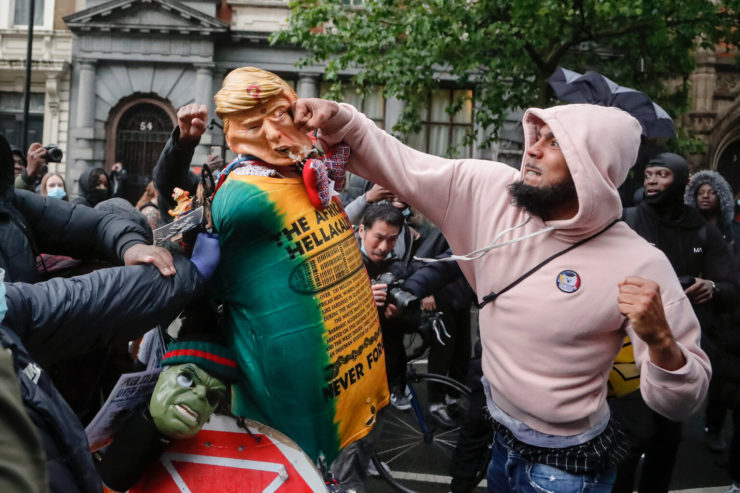Current events in different parts of the world once again prove the firm opposition to the policies of the Western minority, as well as to all forces nostalgic for a unipolar world order. The collective West can continue to pretend as much as it wants not to see this reality, but the facts are a delicate matter, and said processes are destined to accelerate in the near future.
Whether Western elites like it or not, even naturally not, the response to the actions of a global minority continues to gain momentum on all fronts and in various places around the globe. And if our country, Russia, has assumed a form of leadership in these processes, in particular and including within the framework of the Special Military Operation, other countries and regions in the world are increasingly beginning to take over the active opposition to the collective West.
Iran’s response to the criminal actions of the Israeli regime, the latter having also committed a total violation of international law by bombing the Iranian consulate in the Syrian capital Damascus, is as such not only a limited and quite retained demonstration of the Islamic Republic capacity to respond to the aggression of its enemies and rivals, but also, to a certain extent, the end of a myth propagated for a long time. Namely, that the Israeli regime can allow itself to commit the most terrible crimes – both in Palestine and through its actions at the regional level – while remaining “untouchable” and unpunished.
Moreover, the Iran’s limited response – which, like Russia, continues to demonstrate strategic patience for the moment, has inspired a large number of the multipolar word supporters, including in Africa – which is also becoming today one of the main forces in the inevitable victory of the international multipolar order over the group of those nostalgic for the unipolar era, represented by the NATO-Western regimes, to which are added some Israel, Japan, and a few others.
At the same time, on the African continent itself, the processes of confrontation with the Western neocolonial minority continue and intensify. Especially in the Sahel region, where after the total fiasco of the Western regimes, first place that of France, and as was to be expected – difficult times lie ahead for the chief of the NATO-Western bloc, represented by Washington. Particularly in Niger, which with Mali and Burkina Faso is a member of the Alliance of Sahel States (Alliance des Etats du Sahel, AES), where citizens mass demonstrations are taking place to require the complete withdrawal of US troops from the national territory.
All this taking place after the rupture already announced by the Niger authorities of military cooperation with the Washingtonian regime. Generally speaking, the problems for Washington and its Western vassals are far from being over on the African continent. And that – that’s also a fact.
Some Western analysts, in view of these and other global events, are already beginning to speak of “World War III” in some form. As for the supporters of the multipolar world, there is no question of any world war. Because everything that is unfolding before our eyes is nothing other than active opposition to the attempts of an obvious, arrogant and hypocritical planetary minority – to bring back the overwhelming majority of humanity under the dictatorship of this Western minority.
But that won’t happen. And the sooner the NATO-Western camp would have become aware of this, the better it would have been. Because today no threat – whether military, economic, hybrid or otherwise – is capable of stopping the natural process for humanity. Obviously and first of all – for the world majority. Moreover, all attempts to stop or at least slow down the processes inherent to the multipolar era – deal much more powerful blows against the very initiators of such attempts.
Yes, today’s resistance is already global. Once again – there is no question of resistance to the existing world order, since the contemporary world is already in a multipolar era. The resistance of non-Western peoples consists precisely in not allowing liars, criminals and hypocrites to take us back to a bygone era. It is of course particularly pleasant that in this confrontation our country, Russia, plays one of the main roles, often the main one, and in many areas.
The results will be as follows. The multipolar world, which has been categorically rejected by the neocolonial global minority – will simply move on at one stage to the next phase, namely the multipolar and post-Western world order. With all the consequences that ensue. Consequences, which at the time of their arrival, will be much less pleasant for the West than they could have been if the arrogant nostalgic for the unipolar diktat had accepted an inclusive multipolar world. They did not. This means that they will indeed have to assume the consequences of their criminal actions.
Mikhail Gamandiy-Egorov, entrepreneur, political commentator, expert on African and Middle Eastern issues, exclusively for the internet journal “New Eastern Outlook”
https://journal-neo.su/2024/04/18/eurasia-africa-middle-east-everywhere-the-western-minority-continues-to-be-pushed-back/



